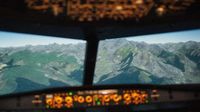A New Perspective on the Germanwings Tragedy: Was It an Accident or a Technical Failure?
New investigations surrounding the 2015 Germanwings crash challenge the accepted narrative that the co-pilot deliberately crashed the aircraft.
As the aviation world reflects on the impending tenth anniversary of the tragic Germanwings flight 9525 crash, questions surrounding the events of that fateful day continue to swirl. On March 24, 2015, the Airbus A320 was en route from Barcelona to Düsseldorf when it crashed into the French Alps, resulting in the deaths of all 150 people aboard. The official investigation concluded that co-pilot Andreas Lubitz, who had a history of mental illness, intentionally crashed the plane in a suicide attempt. However, new insights are emerging that challenge this theory.
According to a report from the French Bureau of Enquiry and Analysis for Civil Aviation Safety (BEA), the crash was believed to have been caused by a conscious and planned action by Lubitz, who was alone in the cockpit at the time. Yet, Simon Hradecky, an aviation expert and operator of the website The Aviation Herald, suggests that the change in altitude from 38,000 feet to 100 feet might not have been the result of human action but rather a technical malfunction. Hradecky points out that this drastic altitude drop took place within one second, a speed he deems suspicious because it is typically physiologically impossible to maneuver the controls so rapidly.
Patrick Huber, an aviation photographer and journalist who authored a book titled “Germanwings Flight 9525,” supports Hradecky’s assertion, stating that a manual adjustment of that nature would not usually occur in such a brief period. Both Hradecky and Huber indicate that, during the descent, the sound of the altitude adjustment knob was not recorded by the cockpit microphones, hinting at a possible technical failure.
“It is accurate that such a change in altitude typically cannot happen within one second. I have tested this in the simulator during my research for my book and various pilots have confirmed this to me,” Huber noted. However, he warns that such findings do not negate the overall investigation results, which include crucial forensic evidence such as recorded cockpit audio and DNA traces collected from the crash site.
Adding complexity to the debate, Hradecky highlights that the same altitude setting to 100 feet was reported during the outbound flight to Barcelona when Lubitz was again alone in the cockpit. “It raises questions why this alleged error was not reported,” he says, underlining the ambiguity surrounding Lubitz’s actions. Despite the potential for mechanical error, many remain firm in their belief that Lubitz intentionally caused the accident.
Even the prosecutor’s office in Düsseldorf has no doubts regarding Lubitz’s intent, affirming that the investigation conclusively demonstrated his responsibility for the crash. “There is not the slightest legal doubt about the co-pilot's responsibility for the crash. The investigations have made this abundantly clear,” stated Christoph Kumpa, a prosecutor.
Compellingly, the Sky documentary titled “Germanwings - What Happened on Board Flight 9525?” ran on March 14, 2025, raising further questions about the traditional understanding of the tragedy. It features interviews with bereaved families and insights from various experts, including Simon Hradecky. The documentary's narrative suggests a review of the 'rapid descent' and highlights apparent inconsistencies surrounding the BEA’s reports.
As viewers learn about the chaotic moments leading up to the crash, testimonies reveal that Lubitz reportedly maintained silence and did not respond to his colleague's desperate attempts to reenter the cockpit. A relative of one victim expressed, “What was presented as a precise narrative seemed unfounded upon closer examination.”
Questions arise concerning Lubitz’s purported medical issues and medication; none were mentioned in the BEA report, stirring suspicion and disbelief among families of the victims. According to interviews, the co-pilot was absorbed in prescription medications, potentially clouding his judgment.
The challenges faced by investigators and the frustrations expressed by victims' families only compound the uncertainty. Concerns have emerged, particularly regarding the decision to delete critical recordings—like the last twelve minutes of flight data—before releasing materials to relatives. This has fueled anxiety and mistrust. “When the release of such crucial minutes is kept a secret, I feel betrayed,” expressed one family member.
The Sky documentary serves as a platform for these voices, showcasing the long-lasting impact on families and the unanswered questions surrounding the crash. As new theories gain momentum, it is imperative for the appropriate authorities to consider these allegations with transparency.
The complex nature of the Germanwings tragedy illustrates how the quest for truth remains a challenging endeavor. As families continue to seek closure, the investigation's findings, alongside other interpretations, paint a multifaceted picture of the events leading up to March 24, 2015. It is a continuing discourse that addresses not just the loss of lives but the essential need for the truth.





